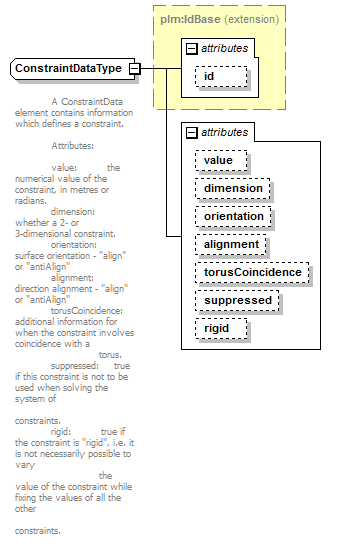| diagram |  |
||||||||||||||||||||||||||||||||||||||||||||||||||||||
| namespace | http://www.plmxml.org/Schemas/PLMXMLSchema | ||||||||||||||||||||||||||||||||||||||||||||||||||||||
| type | extension of plm:IdBase | ||||||||||||||||||||||||||||||||||||||||||||||||||||||
| properties |
|
||||||||||||||||||||||||||||||||||||||||||||||||||||||
| used by |
|
||||||||||||||||||||||||||||||||||||||||||||||||||||||
| attributes |
|
||||||||||||||||||||||||||||||||||||||||||||||||||||||
| annotation |
|
||||||||||||||||||||||||||||||||||||||||||||||||||||||
| source | <xsd:complexType name="ConstraintDataType"> <xsd:annotation> <xsd:documentation> A ConstraintData element contains information which defines a constraint. Attributes: value: the numerical value of the constraint, in metres or radians. dimension: whether a 2- or 3-dimensional constraint. orientation: surface orientation - "align" or "antiAlign" alignment: direction alignment - "align" or "antiAlign" torusCoincidence: additional information for when the constraint involves coincidence with a torus. suppressed: true if this constraint is not to be used when solving the system of constraints. rigid: true if the constraint is "rigid", i.e. it is not necessarily possible to vary the value of the constraint while fixing the values of all the other constraints. </xsd:documentation> </xsd:annotation> <xsd:complexContent> <xsd:extension base="plm:IdBase"> <xsd:attribute name="value" type="xsd:double" use="optional"/> <xsd:attribute name="dimension" type="plm:DimensionalityType" default="3"/> <xsd:attribute name="orientation" type="plm:ConstraintAlignmentEnum" use="optional"/> <xsd:attribute name="alignment" type="plm:ConstraintAlignmentEnum" use="optional"/> <xsd:attribute name="torusCoincidence" type="plm:ConstraintTorusCoincidenceEnum" use="optional"/> <xsd:attribute name="suppressed" type="xsd:boolean" use="optional"/> <xsd:attribute name="rigid" type="xsd:boolean" use="optional"/> </xsd:extension> </xsd:complexContent> </xsd:complexType> |
attribute ConstraintDataType/@value
| type | xsd:double | ||
| properties |
|
||
| source | <xsd:attribute name="value" type="xsd:double" use="optional"/> |
attribute ConstraintDataType/@dimension
| type | plm:DimensionalityType | |||||||||
| properties |
|
|||||||||
| facets |
|
|||||||||
| source | <xsd:attribute name="dimension" type="plm:DimensionalityType" default="3"/> |
attribute ConstraintDataType/@orientation
| type | plm:ConstraintAlignmentEnum | |||||||||
| properties |
|
|||||||||
| facets |
|
|||||||||
| source | <xsd:attribute name="orientation" type="plm:ConstraintAlignmentEnum" use="optional"/> |
attribute ConstraintDataType/@alignment
| type | plm:ConstraintAlignmentEnum | |||||||||
| properties |
|
|||||||||
| facets |
|
|||||||||
| source | <xsd:attribute name="alignment" type="plm:ConstraintAlignmentEnum" use="optional"/> |
attribute ConstraintDataType/@torusCoincidence
| type | plm:ConstraintTorusCoincidenceEnum | ||||||||||||
| properties |
|
||||||||||||
| facets |
|
||||||||||||
| source | <xsd:attribute name="torusCoincidence" type="plm:ConstraintTorusCoincidenceEnum" use="optional"/> |
attribute ConstraintDataType/@suppressed
| type | xsd:boolean | ||
| properties |
|
||
| source | <xsd:attribute name="suppressed" type="xsd:boolean" use="optional"/> |
attribute ConstraintDataType/@rigid
| type | xsd:boolean | ||
| properties |
|
||
| source | <xsd:attribute name="rigid" type="xsd:boolean" use="optional"/> |
XML Schema documentation generated by XMLSpy Schema Editor http://www.altova.com/xmlspy